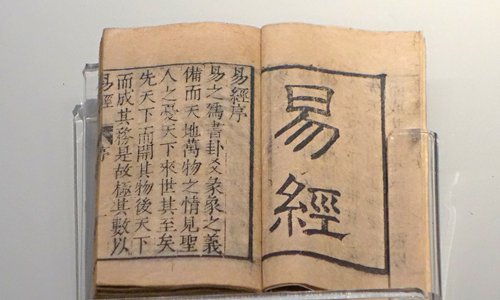HOME >> CHINA
CASS approves ‘superstitious’ postgraduate course on Book of Changes
By Zhang Hui Source:Global Times Published: 2019/9/9 22:28:40

A picture of Book of Changes, or I Ching, taken on November 13, 2018, at the Shanghai Museum. Photo: IC
The ancient Chinese classic Book of Changes, or I Ching, has been officially deemed a research direction for doctoral students at the nation's highest academic research organization in philosophy and social sciences this year, triggering debate among internet users over whether the course amounted to a real philosophy or mere feudal superstition.On the website of the University of Chinese Academy of Social Sciences (CASS) in Beijing, the Global Times reporter found I-Ching and Prediction Theory was included in its 2019 full-time doctoral student recruitment plan.
The influential divination text dates back to the Western Zhou Dynasty (1046 BC-771 BC) and its philosophical system of diagrams has provided inspiration to religion, psychoanalysis, literature and art.
The tutor is listed as Tan Degui, a research fellow at the CASS Institute of World Religions.
The course was listed at the philosophy department, with no explanation of the content.
Tan could not be reached on Monday, but according to the institute's website, Tan has taught a course on I Ching and Chinese culture to postgraduate students at the CASS world religion department in 2010.
Tan previously said in classes that I Ching was the core of traditional Chinese culture and that feng shui seeks a state of harmony between individual and nature.
Mystery should not be seen as superstitious, Tan has said. Many of Tan's students have publicly backed his class.
Meanwhile, Chinese internet users were split on the issue.
Some posted on China's Twitter-like Sina Weibo that CASS was bringing pseudoscience and superstition into class, while others praised the traditional Chinese culture and Taoist principles of I Ching.
"I highly doubt the value of I-Ching's study, considering its superstition. Why learn it?" a user posted.
"It's the wisdom of our ancestors, and I am very interested to learn it," replied another.
Liang Xingyang, secretary-general of the Changan District Taoist Association in Xi'an, Northwest China's Shaanxi Province, told the Global Times on Monday that I Ching does not contain superstition, but some people over the centuries used its derived theories to tell fortunes and added superstition to its derived theories.
"I Ching has had a huge impact on China's history, culture and way of thinking since ancient times," Liang said. "Studying and discussing it is what CASS should do."
It was "unscientific" to ban I Ching from colleges, he said, and students should debate or discuss it in their classes.
I Ching is a Confucian classic and subject at many Chinese universities.
East China's Shandong University has a center for I Ching learning and ancient Chinese philosophy.
Newspaper headline: CASS approves ‘superstitious’ postgraduate course
RELATED ARTICLES:
Posted in: SOCIETY